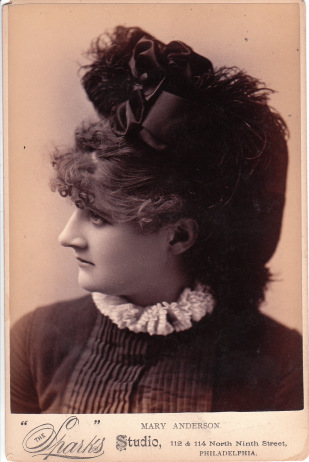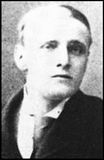Oscar Wilde & The Duchess of Padua
Oscar Wilde undertook to complete his second play, The Duchess of Padua, by this date (1 March) in 1883 and he signed a contract to that effect:
…a first class Five act tragedy to be completed on or before March 1st 1883 – Said tragedy to be the property of Miss Mary Anderson and her heirs forever.
In return, he was to receive $5,000, although just $1,000 was paid in advance with the balance falling due if, and only if, acclaimed American actress Mary Anderson approved his completed manuscript.

As Wilde had every expectation that his play would be accepted, he saw no reason to economise. He used Anderson’s advance to secure a suite of rooms on the second floor of the Hotel Voltaire, overlooking the Seine in Paris. When his friend Robert Sherard called on him, he saw evidence of industry scattered all about the living room; ‘a glance at these sheets showed that many of the lines had been written over and over again’, he recalled.
Wilde and Sherard, a great-grandson of poet William Wordsworth, met in Paris early in 1883 and got along exceptionally well. Since Sherard was estranged from his family and struggling to make a living as a writer, Wilde treated him to dinner at the celebrated restaurant in the Hotel Foyot. Making light of the cost, he declared: ‘we dine with the Duchess to-night’.

Robert Harborough Sherard
It’s thought likely that the contract between Wilde and Anderson was amended since he did not dispatch his completed manuscript until 15 March and he offered no word of apology. He following up with a long and exceptionally revealing letter outlining the approach he had taken to: ‘the masterpiece of all my literary work, the chef-d’oeuvre of my youth’. Noteworthy, at this early stage, is his absolute conviction that an element of comedy was essential in even the darkest tragedy, since no audience, he believed, would weep unless it was first made to laugh.
When Anderson turned the play down, Sherard was there to witness his friend’s muted reaction:
…he gave no sign of his disappointment. I can remember his tearing a little piece off the blue telegraph-form and rolling it up into a pellet and putting it into his mouth, as, by curious habit, he did with every paper or book that came into his hands. And all he said, as he passed the telegram over to me, was, “This, Robert, is rather tedious”.
To discover why Anderson rejected The Duchess of Padua, how Wilde exacted his revenge and whether the play was ever performed you’ll have to read Wilde’s Women.

Sherard, Real Oscar Wilde, p.218





